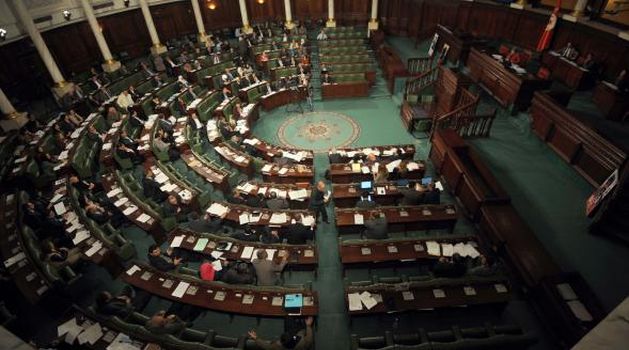The Tunisian National Constituent Assembly’s vote against an article in new draft electoral legislation banning Ben Ali-era officials from participating in politics was so significant it attracted much attention last week. Had it been passed it would now be part of the country’s electoral law.
In order to understand the meaning and implications of this, it is important to remember that the article would have banned all former officials from the government of former president Zine El-Abidine Ben Ali and members of the now-dissolved Democratic Constitutional Rally (RCD) from contesting the legislative elections.
It would not be an exaggeration to say that the draft article, whose backers say was intended to protect the revolution, was the most controversial in the draft electoral law. While the initial banning of Ben Ali-era figures from participating in the constituent assembly elections in 2011 was met with approval, the recent draft law was rejected by several opposition parties and civil society activists.
Keeping open door of political participation to all sides without exception, including former regime figures and thousands of RCD members, is a significant development in Tunisian politics.
One logical implication of the rejection of the proposed “political isolation law” is that the former ruling Troika failed to meet people’s social and economic expectations, particularly in terms of maintaining security and protecting the country against the danger of terrorism. The psychological, social and political rift that opened up between the Troika and the public following the assassination of Chokri Belaid weakened its authority. I believe the failure of the Troika helped pave the way for the rejection of the proposed political isolation legislation, particularly as it was not so much based on principle as an attempt to eradicate political opponents, most prominently the Nidaa Tounes movement. This is not to mention the fact that the article’s proponents used it as a tool to impose political pressure, which explains why the Ennahda Movement didn’t clarify its position on the article until relatively recently. One reason why I am specifically focusing on Ennahda is that it played a key role in rejecting the political isolation draft law because it forms the largest bloc in the National Constituent Assembly.
At this point we reach the second implication of the rejection of the draft law: namely, that a sort of rapprochement has taken place between Ennahda and Nidaa Tounes—the side that will benefit most from the rejection of the law—following a period of serious friction between the two parties.
This rapprochement without doubt sends a strong signal about what the nature of Tunisia’s political scene will be in the future. In fact, many parties read the shift in Ennahda’s position on the proposed political isolation law as a sign that it had reached a political deal with Nidaa Tounes.
On the face of it, of course, that might be the case. But the main reason behind Ennahda’s approach is that the current political, economic, security and social situation necessitated a rejection of the article. Rejecting political exclusion sends a strong, positive message both at home and abroad, making it possible to deal collectively with the issues of terror and border security. In other words, Ennahda’s decision to vote against the draft article—employing its relative majority in the constituent assembly—was a premeditated and calculated step.
On the other hand, it seems that fears of the return of former regime figures and their style of governance can be revised for many reasons. The authoritarian Ben Ali regime cannot return because Tunisia has made too much progress, including in the field of promoting political freedoms and human rights.
As for the Ben Ali-era figures—a term that also requires revision given the dominance of the former regime over Tunisian politics—some of them have declared they are going to stay out of politics, while others have expressed their desire to either form or join political parties. This desire will be constrained by the new laws and a political and civil reality that is radically different from that prior to the revolution. It is becoming clearer that Tunisia is on course to reach a state of political coexistence between former members of the RCD and Ennahda. This will lead to a situation where two parties monopolize power in Tunisia, with each imposing limits on the other in terms of ideology and practice—something which in itself will be positive.
